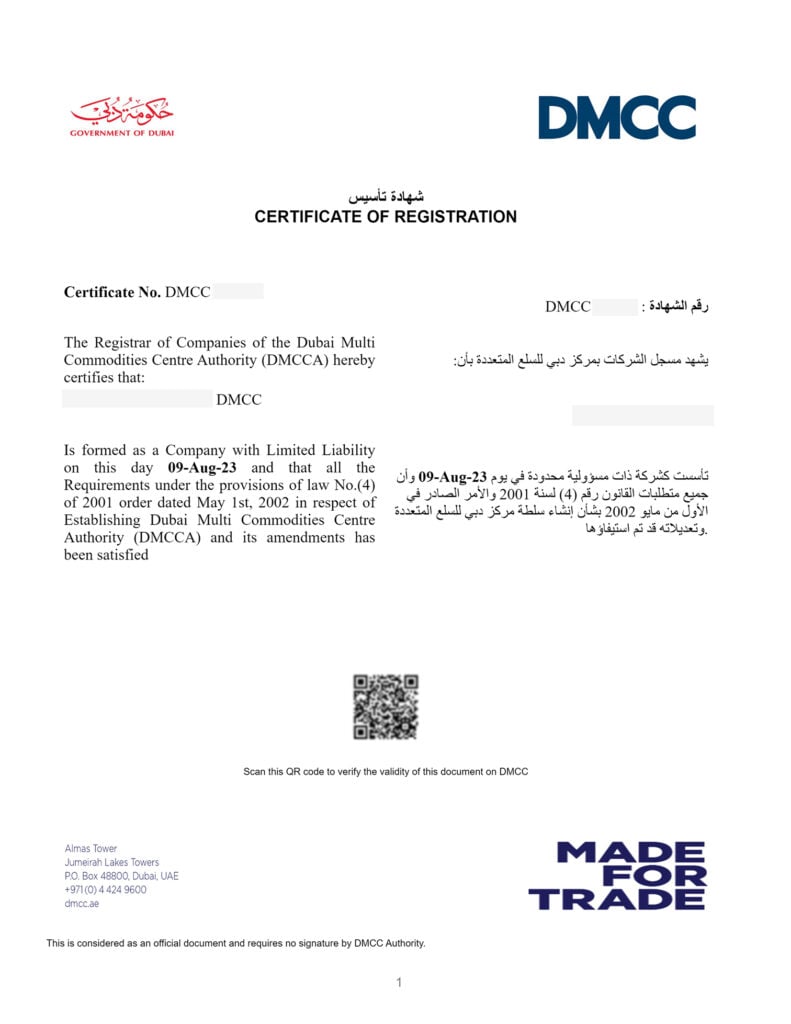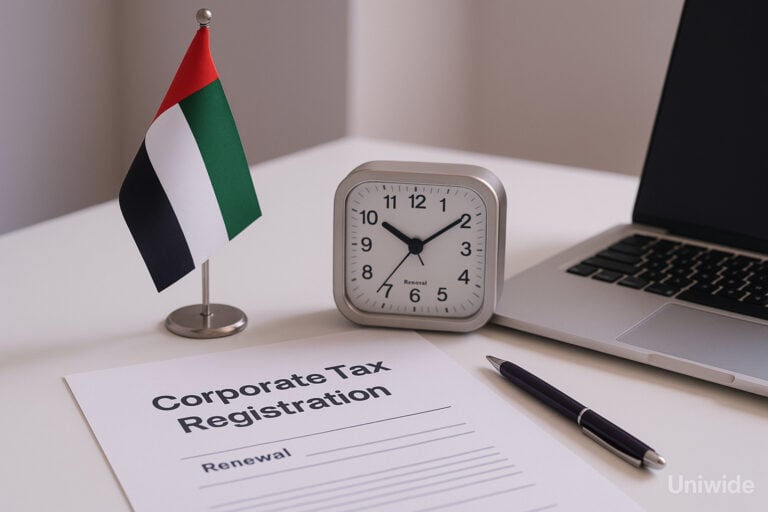Introduction to Business Setup in Dubai
This article will help you understand how to set up a company in Dubai. We will look at Dubai companies’ incorporation, licensing, tax reporting and legal compliance. We will also advise you on how to make business setup in Dubai straightforward and stress-free.
Dubai is the best-known and leading part of the United Arab Emirates. Today, Dubai is a rapidly developing international trading and financial centre. It offers numerous options for starting a business in a wide variety of industries.
Understanding Dubai’s Business Environment
Dubai’s business environment is geared towards foreign investors and skilled professionals from around the world. For these purposes, the emirate provides:
- the largest selection of free zones (both general and industry-specific);
- low taxes and favourable tax incentives for companies;
- opening corporate bank accounts in Dubai banks;
- a convenient system of residence visas for investors and employees;
- the infrastructure that caters for the needs of both start-ups and established businesses – from office and residential premises to warehouse and port facilities;
- a broad choice of B2B and lifestyle services.
Legal Framework for Business Setup in Dubai
The primary statute that governs corporate affairs in the UAE is the Federal Decree-Law No. 32 of 2021 On Commercial Companies. The Law applies to all companies operating on Dubai’s mainland. Several types of entities, such as energy sector companies with Government participation, are exempt from the requirements of the Law.
Dubai free zone companies are governed by the rules of the relevant free zone authority. For example, companies incorporated in DMCC (Dubai Multi Commodities Centre), Dubai’s leading free zone, are subject to Company Regulations issued by the DMCC Authority.
Choosing the Right Business Structure in Dubai
The first step is to choose between Dubai’s mainland and free zones. The solution depends on a client’s needs and financial capacities and the proposed scope of the company’s operations. The table below shows the basic features of Dubai’s mainland and free zone companies.
Dubai Mainland Companies
| Registering / licensing authority | Department of Economy and Tourism of the Government of Dubai |
|---|---|
| Main types of companies |
|
| Is a local (Emirati) partner required? | No, 100% foreign ownership is allowed. Restrictions remain for certain strategic industries. |
| Minimum capital | AED300,000 (however, the actual contribution of the capital is required in a limited number of cases) |
| Territorial coverage | A company can carry on business anywhere in the UAE and abroad. |
| Corporate tax | Standard (0% or 9%). Small business relief is available. |
| A preferred choice | Registering a mainland company is the best choice for those who intend to operate mainly in the UAE domestic market. |
Dubai Free Zones Companies
| Registering / licensing authority | The relevant free zone authority. Some free zones are united under a single authority, such as DDA (Dubai Development Authority) or DIEZ (Dubai Integrated Economic Zones Authority). |
|---|---|
| Main types of companies |
|
| Is a local (Emirati) partner required? | No, 100% foreign ownership is allowed. |
| Minimum capital | Depends on a free zone and a company’s activity. The amount can vary from AED1,000 to AED1,000,000. |
| Territorial coverage | A company can carry on business within the free zone or outside the UAE. |
| Corporate tax | Standard (0% or 9%) or 0% for “Qualifying Free Zone Persons” |
| A preferred choice | For those who are seeking the simplest starting point for business setup in Dubai and conducting international commercial activities |
Among the most popular free economic zones in the UAE, the following stand out:
- Dubai Multi Commodities Centre (DMCC)
- International Free Zone Authority (IFZA)
- Dubai International Financial Centre (DIFC)
- Dubai Internet City
- Jebel Ali Free Zone (JAFZA)
- Meydan Free Zone
- Abu-Dhabi Global Market (ADGM)
- Ajman Free Zone (AFZ)
- Ras Al Khaimah Economic Zone (RAKEZ)
Company Types in Dubai
The next step is choosing a suitable legal form. It will depend on the activities, the ownership structure and the preferred management model. For example, if a person plans to own a company solely, he may elect a Single Owner Limited Liability Company or a Free Zone Establishment.
Two or more partners can form an LLC or a FZCO (FZ-LLC), the most popular company types among foreign investors.
Process of Registering a Business in Dubai
The procedures and fees for business registration will differ in the mainland and various free zones. To register a business in Dubai, an investor, with the assistance of a local service agent, will need to:
- Decide on the activities the company will carry out.
- Determine who the company owners (partners) will be and the proportion of their membership interest.
- Create a trade name under which a company will run its business. The name must comply with regulatory requirements and be followed by the relevant ending (for example, FZCO, LLC or others).
- Apply for initial approval from the registering authority. If they do not object to establishing the business, the investor may proceed with the following steps.
- Choose and lease (or buy) a physical office adequate to the proposed activities and register the lease agreement. The lease agreement for office premises will be necessary not only for registering a company but also for opening a bank account.
- Draft and sign a Memorandum of Association.
- Make a service agreement with a UAE local service agent. The agent is required for companies wholly owned by foreigners.
- Register the company in the Commercial Register having paid the required fees.
- Obtain a business license from the Department of Economy and Tourism or a free zone authority and pay the required fees.
- Apply for residence visas for company shareholders and employees (if necessary).
- Open a bank account and contribute the required capital (where necessary).
After the registration, a company will receive the main corporate documents:
- Commercial Register (or Certificate of Registration);
- Commercial License with the licensed activities specified;
- Memorandum of Association certified by the Government or free zone authority.

Navigating Dubai’s Licensing Requirements
There are six types of licenses in Dubai (excluding free zones): industrial license, commercial license, crafts license, tourism license, agricultural license, and professional license. One license may include several activities. A mainland company may choose from over 2,000 economic activities permitted in the UAE. Careful selection of the proposed activities is crucial for obtaining a proper business license and may affect its cost.
Each free zone in Dubai provides its own set of business licenses. Usually, it includes industrial, commercial, service, professional or general trading licenses. One license can cover up to six activities of a similar nature. Adding activities of a different kind will require payment of additional fees. If a company is engaged in the trade of goods but also intends to supply services, it must obtain a separate service license.
A license issued by a free zone authority entitles the company to operate within the relevant free zone. Some free zones like DMCC, DAFZ (Dubai Airport Free Zone) or DIFC (Dubai International Financial Centre) allow dual licenses. Such licenses are issued by the Dubai Department of Economy and Tourism and authorise free zone companies to expand their representation to the mainland.
Complying with Tax and Accounting Norms
Generally, private companies in Dubai are subject to corporate tax and value-added tax (VAT). The tax reporting requirements include submitting corporate tax returns (annually) and VAT returns (quarterly) to the Federal Tax Authority (FTA).
| Corporate tax | |
|---|---|
| Applies for | Dubai mainland and free zone companies |
| Is imposed on | Net accounting profit |
| Tax registration | A company must register for corporate tax and obtain a Tax Registration Number (TRN). |
| Ongoing duties | Maintain financial records and prepare annual financial accounts to determine taxable income |
| Tax return filing deadline | No later than nine months from the end of the relevant tax year |
| Payment of tax | Within the same period as filing the tax return |
| VAT | |
| Applies for | Dubai resident companies which make VAT-taxable supplies |
| Is imposed on | Supplies of goods or services and the importation of goods to the UAE |
| Tax registration | A company must register for VAT and get a VAT TRN, provided it reaches the threshold amount of taxable supplies. |
| Ongoing duties | Issue and receive tax invoices and keep documents related to all taxable supplies |
| VAT return filing deadline | Within 28 days after the end of each tax period (which is usually three months). |
| Payment of tax | By the VAT return filing date |
Companies in Dubai prepare annual financial statements under International Financial Reporting Standards (IFRS). FTA may require a company to submit its financial statements within the prescribed time period. The following entities must prepare audited financial statements:
- Companies that received revenue exceeding AED 50,000,000 (approx. USD 13,615,000) during the relevant tax period and
- Qualifying free zone persons (these are free zone companies that receive “qualifying income” and can enjoy a zero-tax rate under certain conditions).
Hiring and Managing Workforce in Dubai
Companies in Dubai rely heavily on foreign workforce. Employees who are foreign citizens must have a UAE residence visa to live and work in Dubai legally. A company wishing to hire workers from outside the UAE (acting as an employer and sponsor) should take the following steps:
- Get an establishment card from the immigration authority. It allows the company to employ personnel from abroad and apply for residence visas.
- Apply for work permits that enable future employees to enter the UAE for work purposes.
- Obtain residence visas for the employees. A standard residence visa sponsored by the employer is issued for two years. After receiving work permits and residence visas, employees can officially start working in Dubai.
Employment relationships in the UAE private sector are governed by Federal Decree-Law No. 33 of 2021. This Law provides the minimum level of workers’ rights, working patterns, leaves and other conditions. Relations between a company and an employee are formalized in a fixed-term employment contract. The employer’s obligations to the employees include:
- bearing the repatriation expenses of the employee to his place of work;
- bearing the costs of insurance, contributions and guarantees prescribed by law;
- paying salary in Emirati Dirhams or another currency as can be agreed in the employment contract;
- providing a safe and appropriate work environment and other duties.
Role of Corporate Service Providers in Dubai
Due to the multi-step procedures and regularly amended rules, a foreign investor needs professional support. Company formation in Dubai begins with analysing a client’s needs and finding the best solution. This should be done in consultation with a local business setup consultant who is aware of all current requirements of competent authorities.
Local service providers offer support at every stage of the company formation process. Such services usually include:
- liaising with government authorities;
- drafting documents;
- arranging the rental of office space;
- assistance in company incorporation and licensing;
- visa application support for investors and employees;
- bank account opening support;
- other tasks depending on the client’s needs.
To make setting up a business in Dubai smooth, time-efficient and stress-free, we recommend seeking support from an experienced and duly licensed corporate service provider.
Real‐World Insights from Global Leaders
Dubai’s strategic location, pro-business policies and modern infrastructure have not only attracted investors but have also inspired many to share their success stories. The following experiences from industry leaders demonstrate how local engagement and adaptability can pave the way for international growth.
Global Trade and Innovation
“When I expanded my business into Dubai, I was drawn by its reputation as a global trade and innovation hub, strategically located between Europe, Asia and Africa. The pro-business policies, attractive tax incentives and modern infrastructure have allowed me to scale operations and penetrate international markets. I realised that building local relationships was crucial for success, as it deepened my understanding of the cultural and business nuances in the UAE.”
— Erin Siemek, CEO, Forge Digital Marketing, LLC
Strategic Expansion into Energy
“Establishing our presence in Dubai and Abu Dhabi was a strategic decision driven by the region’s pivotal role in the global energy market. The UAE’s leadership in both traditional and renewable energy sectors, along with its business-friendly policies, enabled us to meet the rising demand for specialised talent. By staffing local offices, we have built strong client relationships and become a trusted recruitment partner.”
— Jon Hill, Chairman & CEO, The Energists
Dubai’s Business-Friendly Setup
“Dubai’s business environment, characterised by a straightforward company formation process and significant tax advantages, was the perfect catalyst for our international expansion. The emirate’s focus on technological and educational innovation, combined with access to a diverse, well-educated workforce, has enabled us to extend our high-quality tutoring services across Gulf markets. Frequent local engagements have been key to tailoring our approach to meet market needs.”
— Tornike Asatiani, CEO, Edumentors
Ongoing Compliance and Business Renewal
A company must renew the business licence after one year from the date of incorporation (and further annually), paying the necessary fees. A company may also need to prolong its establishment card and office lease agreement. The latter is essential to confirm that the company possesses a rented office to continue using the bank account with the UAE bank.
All Dubai companies must also comply with the following:
- laws and regulations governing specific business activities;
- economic substance regulations (where applicable);
- labour laws and regulations, including employee rights;
- health and safety requirements;
- residency and immigration rules;
- consumer protection rules;
- intellectual property rights, and others.
Dubai offers a considerable number of company formation options, each with specific features. At first glance, the procedures for starting a company in Dubai may seem lengthy and sophisticated. This is why a foreign business moving to the UAE for the first time will always need professional support. Uniwide Advisors, an established corporate services provider, will handle all the matters of your business setup in Dubai, from initial consultation to compliance with annual requirements.
- Stable jurisdiction;
- Freezones available;
- 100% foreign ownership.




